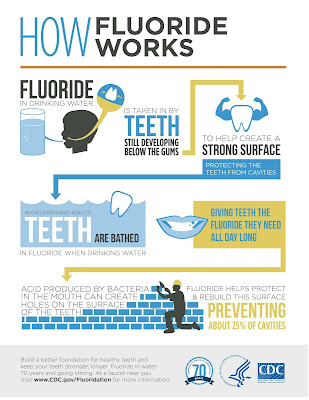What is fluoride?
Fluoride is a natural mineral found throughout the earth's crust and widely distributed in nature. Some foods and water supplies contain fluoride.
Fluoride is also added to toothpaste, mouthwash and drinking water. And it is the actual ingredient that helps to strengthen tooth enamel. Fluoride helps prevent tooth decay by making the teeth more resistant to acid attacks from plaque bacteria and sugars in the mouth.
How does fluoride strengthen the teeth?
When it reaches your teeth, fluoride is absorbed into the enamel. It helps to repair the enamel by replenishing the lost calcium and phosphorous to keep your teeth hard.
How does fluoride work?
Fluoride helps prevent cavities in two different ways:
- Fluoride concentrates in the growing bones and developing teeth of children, helping to harden the enamel on baby and adult teeth before they emerge
- Fluoride helps to harden the enamel on adult teeth that have already emerged
Fluoride works during the demineralization and remineralization processes that naturally occur in your mouth.
- After you eat, your saliva contains acids that cause demineralization a dissolving of the calcium and phosphorous under the tooth's surface
- At other times when your saliva is less acidic it does just the opposite, replenishing the calcium and phosphorous that keep your teeth hard. This process is caused remineralization. When fluoride is present during remineralization, the minerals deposited are harder than they would otherwise be, helping to strengthen your teeth and prevent dissolution during the next demineralization phase.





No comments:
Post a Comment
Comment on this. And submit.